CIAP’s Service with Integrity Marks its 42nd-Anniversary Celebration
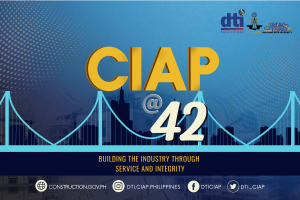
As the country’s economic conditions progress, the Construction Industry Authority of the Philippines (CIAP) is building the industry with service and integrity.
On its 42nd anniversary, spurred by this year’s theme, ‘Building the industry through service and integrity’, the Department of Trade and Industry (DTI)-CIAP will continue to serve by developing and implementing programs towards a vibrant and globally competitive construction industry.
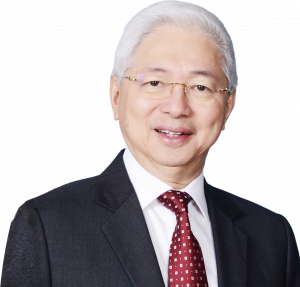 Trade Secretary Alfredo Pascual said over the years, the construction industry has been one of the main contributors to the country’s gross domestic product (GDP). From the first quarter to the third quarter of 2022, it contributed 12.2% to the country’s GDP.
Trade Secretary Alfredo Pascual said over the years, the construction industry has been one of the main contributors to the country’s gross domestic product (GDP). From the first quarter to the third quarter of 2022, it contributed 12.2% to the country’s GDP.
“We remain committed to building with integrity, a value espoused in the Philippine Construction Industry Roadmap (PCIR) 2020-2030,” Pascual said.
DTI recognizes the growth and development of the construction industry, as a major contributor to nation-building. It is an extensive industry that provides opportunities for the growth of other sectors, to generate income, and create jobs.
“To achieve our endeavors, we call on our partners in government and the private sector to continue to provide invaluable support to the programs of CIAP and its implementing arms. These arms include the Philippine Contractors Accreditation Board (PCAB), Philippine Overseas Construction Board (POCB), Philippine Domestic Construction Board (PDCB), Construction Manpower Development Foundation (CMDF), and Construction Industry Arbitration Commission (CIAC),” he added.
Pascual said they have set the path to proactively provide the foundations for infrastructure development. “Together, we work to support President Ferdinand R. Marcos, Jr.’s administration in its “BUILD BETTER MORE” program”.
“Let us build more and build better,” he said, adding that the program allows key infrastructures to enable and sustain economic growth.
The private sector is expected to leverage such prioritization, pursuing private construction projects in the domestic and overseas markets. DTI-CIAP will take off from these developments to advance the construction industry for the country’s economic transformation, and foster optimism that the construction industry will be more robust, vibrant, and resilient.
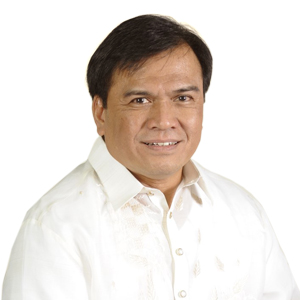 Ireneo V. Vizmonte, DTI undersecretary and CIAP alternate chairman said, the celebration is another milestone for the CIAP, as it endures its steadfast commitment to promote, accelerate, and regulate the construction industry.
Ireneo V. Vizmonte, DTI undersecretary and CIAP alternate chairman said, the celebration is another milestone for the CIAP, as it endures its steadfast commitment to promote, accelerate, and regulate the construction industry.
Proof of the ClAP’s commitment is the PCIR, which envisioned the construction industry as a key global partner in building nations.
“In realizing this vision, we are confident that ClAP will continue to encapsulate its promises of “Tatag at Tapat” or Building with Integrity through strong partnerships with stakeholders in implementing policies and programs, which support productivity improvements, sustainability awareness and industrialization, increased number of globally competitive and allied players as well as strengthened and empowered institutions,” Vizmonte said.
He added that ClAP and industry stakeholders will continue to rally behind this vision in the years to come.
 Doris U. Gacho, CIAP Executive Director-In-Charge said the hard work and collective efforts of the people behind CIAP, including the bosses, partners in government and the private sector helped spur the growth and development of the construction industry.
Doris U. Gacho, CIAP Executive Director-In-Charge said the hard work and collective efforts of the people behind CIAP, including the bosses, partners in government and the private sector helped spur the growth and development of the construction industry.
“We would like to highlight the strengthened efforts of CIAP in building the construction industry through our utmost commitment and service, delivered with integrity, honesty, and excellence. The path ahead and beyond may be challenging and unpredictable, but through our solidarity and passion, realizing our targets and surpassing our goals, these are possible,” she said.
Construction industry remains a growth driver
According to the Philippine Statistics Authority (PSA), the Philippine economy posted a 10.1 percent growth in the first nine months of 2022. GDP grew by 7.7 percent from the first to the third quarters of 2022. The GDP growth was driven by the performances of the services sector at 8.9% and the industry sector at 7.5%. Growth in the industry sector was boosted by the strong performances of construction at 15.8%, mining and quarrying at 6.2%, manufacturing at 5.3%, and utilities at 4.8%.
The construction industry contributed 62% to overall capital investments or gross capital formation (GCF) in the country. The share of the construction industry to total employment is robust at 9.44% from January to September 2022. It continued to provide job opportunities, employing on the average a total of 4.388 million workers in the first nine months, as compared to the 4.369 million in the first nine months of 2021.
Construction output, as measured by the gross value added (GVA) amounted to Php 982.8 billion, an increase of 15.8% from Php 848.5 billion, mainly driven by the accelerated public construction activities.
Construction investments, as measured by the gross value in construction (GVC) is at Php 2.07 trillion, an increase of 14.5%, compared to the Php 1.808 trillion last year.
Government infrastructure investments valued at Php 834.4 billion, increased by 14.8 percent due to the implementation of infrastructure projects under the BUILD BUILD BUILD program.
Private construction activities covering financial and non-financial corporations was valued at Php 692.0 billion, which increased by 20.3 percent. The households and non-profit institutions serving households (NPISHs) was valued at Php 544.4, an increase of 7.5 percent. Growth is brought by the continuous demand for high-rise residential condominiums and commercial buildings. The construction industry is seen to be in the limelight, as the government continues to implement infrastructure programs.
Construction industry shows a positive outlook
Simply analyzing and addressing the impacts brought by the pandemic and the war in Ukraine may be insufficient, for the construction industry to emerge stronger from these crises. It is vital to develop a deep understanding of the changing market.
To detect and assess these shifts, the first step is to lay out the consequences of new behavioral and economic trends to determine which specific structures or projects will most likely grow or contract in terms of demand. The pandemic forced people to stay at home.
As a result, there is an increase in demand for residential dwellings that are capable of essential facilities, such as office space. The changes in the constructors’ project demand experienced during the pandemic may be used as a reference and guide for the fluctuating construction market.
Reduced workforce due to health and safety requirements was among the most prominent impacts of the pandemic. With less manpower, productivity would eventually decrease. Different strategies were used to maintain acceptable operational performance and productivity levels despite the fewer personnel.
Flexible work arrangements were implemented to reduce the traffic inside the workplace, without decreasing the necessary number of work hours. This included remote set-up, staggering work shifts, and a skeletal workforce.
Additional costs put more financial burden on the contractors. It was crucial to develop strategies to extend the cash flow and continue operations, such as careful monitoring and use of resources. The Republic Act No. 11494 or the Bayanihan to Heal as One Act offered leeway regarding the existing and future loans. A 60-day grace period was given for the payment of all existing loans and the relaxation of the requirements for any business-related loans and financial accommodations.
The Bayanihan Act aided in the construction industry’s recovery by prioritizing the budget for local infrastructure programs of the Department of Public Works and Highways (DPWH). The law also directed DPWH to expedite existing infrastructure projects to generate jobs and aid in the recovery of the local economy.
As an archipelago, the country requires efficient and modern transport infrastructure, logistics facilities, and power infrastructure to facilitate and sustain socio-economic growth to improve our global competitiveness and promote physical and digital integration. The use of digital tools and modern methods is the key.
Infrastructure to get P718 billion budget
The Php 5.268 trillion proposed 2023 national budget, includes funds for programs and projects that will transform the country’s economy towards inclusivity and sustainability.
According to the 2023 proposed national budget, around Php 718.4 billion will be allocated for infrastructure which is one of the priority sectors.
During the first State of the Nation Address (SONA), President Marcos Jr., said the backbone of an economy is infrastructure. He wants to continue and expand the infrastructure program of his predecessor. “We must keep the momentum and aspire to build better and more,” Marcos said.
CIAP’s thrust is rooted in the PCIR, in which both public and private sector stakeholders have committed to implement its vision, strategies, action plans rooted on values of the construction industry.
PCIR aspires a Php 130 trillion worth of construction business that will be generated starting 2020 to 2030, by providing strong foundations of infrastructure development. Leveraged by a determined private sector, expanding and multiplying the collective physical investments will support the accelerated, sustainable, and inclusive national development.
To achieve this vision, CIAP identified 7+1 Action Plans, which include CIAP Revitalization Plan, Communications Plan, Infrastructure Masterplan Development Advocacy Plan, Policy Reform Advocacy Plan, Government-Industry-Academe Partnership Action Plan, and Construction Services Exports and Outsourcing Plan. These support the continuity of CIAP’s actions to spur the growth and development of the construction industry.
Implementing the Construction Industry Roadmap
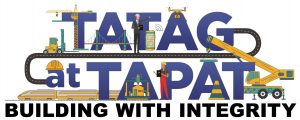
CIAP and its implementing Boards—Philippine Contractors Association Board (PCAB), Philippine Overseas Construction Board (POCB), Philippine Domestic Construction Board (PDCB), Construction Manpower Development Foundation (CMDF) and Construction Industry Arbitration Commission (CIAC) continue to champion the construction industry through formulating and implementing policies and programs to support its growth and development.
CIAP and its implementing boards crafted the Philippine Construction Industry Roadmap (PCIR) 2020-2030 in partnership with both public and private stakeholders. Leveraging its network, CIAP invoked the support of its partners, for House Bill 8151, or the “Proposed 30-year National Infrastructure Program Act of 2021”, authored by Representative Romeo Momo Sr..
Orientation briefings, meetings and information sessions were organized with valued partners including the Davao Constructors Association (DACCI) and the Philippine Constructors Association, Inc. (PCA) with the Council of Leaders and DTI–Undersecretary Vizmonte to discuss the industry’s “Respond, Recover, Return, Re-imagine, Reform amidst the coronavirus pandemic”.
Anchored on the PCIR, CIAP mobilized stakeholders’ support for the “30 Year National Infrastructure Program Act of 2021,” which seeks to provide a framework for infrastructure development in the next 30 years and ensure resource allocation and continuity in the development and implementation of infrastructure projects. This has been discussed and approved by the House of Representatives Committee on Public Works and Highways (CPWH), where several amendments were proposed.
CIAP participated in several construction events such as the PhilConstruct 2022, held in Manila, Clark, Cebu, and Davao to showcase CIAP’s programs and services for stakeholders.
CIAP held its first stakeholders meeting under the new administration, attended by stakeholders and representatives of different contractor associations from different regions. The meeting was used as a venue to surface issues and propose strategies to address procurement inaccuracies, as well as taxation concerns, among others.
Enhancing trainings and seminars
CMDF strategically delivered human resource development (HRD) initiatives and interventions centered on building capacities and raising the competitiveness of the country’s construction workforce.
This year, CMDF has implemented 148 programs (Managerial & Supervisory, Safety, Certification, and Industry-supported) benefitting a total of 7,459 construction professionals and workers as of 31 October 2022.
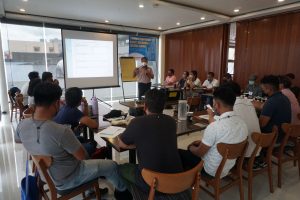
Apart from performing its core functions, CMDF has explored various ways in improving its capacity and capability to upskill the Filipino construction workforce while aligning its thrust with the government’s 8-point socioeconomic agenda.
CMDF creates quality jobs by increasing employability, encouraging research and development and innovation, and enhancing the digital economy. These key supplemental initiatives include the Philippine Skills Framework for Construction (PSFC).
CMDF, in collaboration with key industry stakeholders, initiated the development of a forward-looking skills framework that will extensively document the skills and competencies required for all occupational roles in the construction industry.
The PSFC will provide structured career pathways that will guide members of the construction workforce to make sound career decisions. In the same way, it seeks to provide the Academe with vital information on sector trends, and emerging industry skills requirements for the development of progressive and responsive curricula.
Skills Olympics: Digital Bridge Design and Prototype Construction Competition (Intercollegiate Edition)
The competition immersed the students in realistic experiences and real-world conditions to promote a genuine understanding of structural design, construction methodologies, and project management techniques.
Building upon the idea of digitization and automation, a partnership with Bentley Education and Bentley Systems was forged to provide the necessary design software training to upskill the students throughout the competition’s phases.
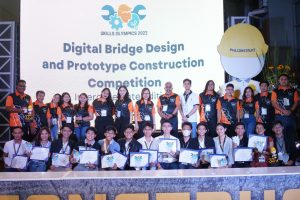
CMDF awarded the top three grand finalists from 13 competing universities and colleges during the PhilConstruct Manila on 06 November 2022:
- TUP Leonns from the Technological University of the Philippines – Manila
- Gray Builders from the Technological University of the Philippines –Cavite
- Bridge Cohorts from the New Era University
 Ofelia R. Usigan, CMDF Officer-in-Charge said on her message, “As we celebrate CIAP’s 42nd founding anniversary, let me extend my sincerest greetings to my colleagues in the Authority on yet another year of exceptional service and quality performance.
Ofelia R. Usigan, CMDF Officer-in-Charge said on her message, “As we celebrate CIAP’s 42nd founding anniversary, let me extend my sincerest greetings to my colleagues in the Authority on yet another year of exceptional service and quality performance.
It is everyone’s dedication and hard work that contributed to this organization’s achievements.
To all stakeholders and industry partners – We thank you for your continued support in advancing CIAP’s mandate and advocacy for our construction industry.
We are looking forward to continue serving with and for the nation.”, she said.
Automating PCAB’s licensing
PCAB continues to develop strategies to make licensing applications faster without compromising the strict implementation of Republic Act (RA) No. 4566 or the “Contractor’s License Law” that ensures the safety of the public, by licensing qualified and reliable contractors to undertake construction in the country.
Recognizing PCAB for its extraordinary acts in the interest of the public through outstanding government service, DTI granted the Secretary’s Award to PCAB on June 30, 2022.
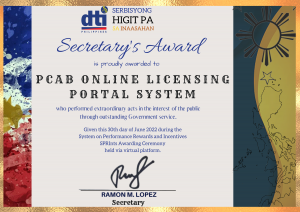
PCAB continues to collaborate with industry partners such as contractors’ associations, tendering agencies, and local government units (LGUs) in the process of improving the ease of doing business.
At the height of the COVID-19 quarantine restrictions, the PCAB Online Licensing Portal, pcab.construction.gov.ph / pcabgovph.com was launched through the technical and IT assistance from the United States Agency for International Development-Delivering Effective Governance for Competitiveness and Inclusive Growth Project (USAID-Deliver Project). The portal was initially designed to facilitate the application of 15,000+ contractors, mandated by law to renew their licenses on 30th of June.
PCAB launched the “Pakyaw” Contractors License in August 2022 to provide a facility to legitimize the operation of small-scale contractors and expanded promotions of this new license are expected to increase licensees.
PCAB proudly announced that all types of application are now 100% fully automated
- Regular Contractors License Application
- Special Contractors License Application
- Standalone Government Registration for Government Infrastructure Projects / also known as “ARCC”
- “Pakyaw” Contractors License Application
It has streamlined the requirements and has fully digitalized PCAB licensing application. Available 24/7, it enabled payments through digital channels such as Paymaya/Maya, GCash and Landbank Linkbiz Portal.
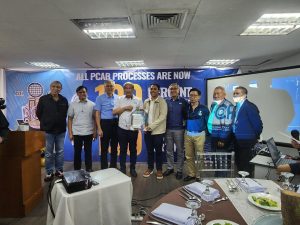
PCAB has allowed online interviews for the newly authorized managing officers and the newly nominated sustaining technical employees (STEs), and provided real-time feedback for the status application. The digital license certificate can now be downloaded. The public can check on contractors’ licenses thru PCAB’s license verification website for public utilization at pcab.construction.gov.ph/verify.
PCAB is now ISO Certified
On 02 November 2022, A CUBE TIC LIMITED, formerly AJA Europe, audited and assessed the requirements, and awarded the ISO 9001:2015 Certification to the Philippine Contractors Accreditation Board.
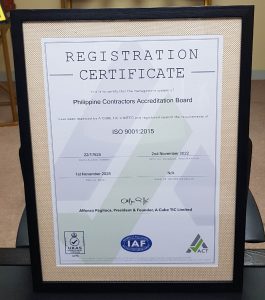
Meanwhile, PCAB reported a 31 percent increase in processed transactions from January to October 2022, which translates to about 47,000 applications, as compared to the same period in 2021 and nearly 123 percent higher than 2020 figures. PCAB highly correlates this massive improvement with the USAID-backed automation initiatives. The PCAB Online Licensing Portal highly contributed to the acceleration of the agency’s ease-of-doing-business compliance, as well as in further stimulating the construction industry’s productivity. More contractors are now licensed to facilitate better monitoring of quality compliance to ensure that infrastructure and construction projects are within industry standards.
PCAB saw a 12% percent increase in total licensed contractors in 2022, which translates to about 19,957 since its automation compared to the same period in 2020 with 17,537.
The convenience brought by the development of an online system that enables electronic filing and payment to secure PCAB licenses greatly encouraged more contractors to comply.
“I know for a fact that it has not been an easy journey these past years, but let me tell you, it was indeed rewarding. Though PCAB may be achieving leaps and bounds, all these were made possible through the boundless support of CIAP.”
It is but proper to Congratulate not just the Top Management that continuously guide this agency, but most especially every staff and personnel, who’s the strong hold of this impregnable organization.
As an old adage says “The achievements of an organization are the results of the combined efforts of every individual”. Again, Congratulations and to the coming years!”, PCAB Executive Director Atty. Herbert D.G. Matienzo on his greeting for CIAP’s 42nd Anniversary.
CIAC in Retrospect
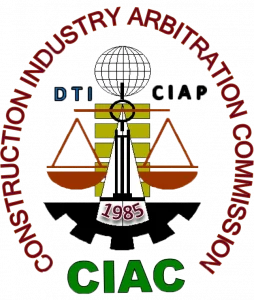
The Construction Industry Arbitration Commission (CIAC) aims to provide a fair and expeditious resolution of construction disputes as an alternative to judicial proceedings. Over the years, policies and programs have been developed to ensure the attainment of its objective. One of its program is the continuous accreditation of construction arbitrators whose main task is to resolve all construction-related disputes filed before the CIAC. The applicants for accreditation training are men of distinction in whom both the business and government sectors can have confidence.
The CIAC started with only twenty (22) accredited arbitrators belonging to the first batch. The accreditation rites and oath-taking ceremonies of the first batch comprising of fifteen (15) successful candidates and seven (7) members of the training faculty was held on December 14, 1988 with Supreme Court Chief Justice Marcelo H. Fernan as the Inducting Officer.
In order to sustain the sufficiency of its pool of accredited arbitrators who shall render quality service to the Commission, the CIAC monitors its number and religiously conducts accreditation of arbitrators. Thus, after the first batch of accreditation of arbitrators, the same was followed by several batches.
In 2021, the CIAC held the accreditation of its tenth batch of construction arbitrators. Out of sixty three (63) applicants, twenty eight (28) passed the screening process who rigorously underwent the training course which culminated on 06 June 2022. On 12 July 2022, the oath-taking ceremony was held with no less than the Chief Justice of the Supreme Court, CJ Alexander G. Gesmundo, as the Inducting Officer. The induction of the 28 successful trainees was done via Zoom platform wherein the Chief Justice was in his sala at the Supreme Court while the inductees were at Hotel Jen in Roxas Boulevard, Pasay City.
To date, a total of one hundred eighty six (186) arbitrators were accredited by the CIAC; fifty five (55) of whom already joined the Creator; five (5) have resigned while four (4) were on leave. A total of one hundred twenty six (126) accredited arbitrators remained in the roster with ninety six (96) arbitrators in the active list. The remaining twenty six (26) arbitrators are either in the reserved list or have yet to complete the observation and reportorial requirements to be eligible for appointment to handle a case.
To continuously update its accredited arbitrators on the latest trends and jurisprudence in construction, and also to apprise them of the new policies of the CIAC, the CIAC conducts four (4) webinars on Mediation and Arbitrators Continuing Education (MACE) Program each year.
The CIAC shall continue to aspire for the betterment of its organization, operation, and services for its clientele and for remarkable contribution to the construction industry and plans to expand or introduce other forms of alternative dispute resolution particularly emergency arbitration.
Delia B. Perlada, CIAC Officer-in-Charge said on her greeting, “In behalf of the Commission and the CIAC Secretariat, please allow me to express my warmest greetings to the Construction Industry Authority of the Philippines (CIAP) on its 42nd Anniversary.

For the 42 years of existence, CIAP has been an instrument for the betterment of the construction industry through development and implementation of its sound programs and policies. Even in the midst of pandemic, CIAP has exhibited its competence to battle the challenges and was able to cope up with the hardships brought about by such unexpected and undesirable occurrence.
It is my personal hope that CIAP will continue its journey towards a more recognized and admirable authority by serving the construction industry with utmost dedication and integrity.
Again, happy 42nd Anniversary, CIAP!”
Promoting overseas construction and market development
The POCB is mandated to regulate, promote and develop the exporters of construction and related engineering services. The Philippines has been a major corporate exporter of technical and managerial expertise in construction since 1970, contributing largely to the economic development of Filipinos, bringing in foreign exchange earnings, and huge employment opportunities. Construction services exporters including architectural and engineering services exporters, construction materials manufacturers, and suppliers are innovating to meet the demands of global consumers thru the use of digital technologies such as Building Information Modeling, Robotics, and Drones in the whole construction process, to name a few.
Nine (9) of the 36 POCB registered corporate service exporters are currently undertaking overseas construction projects aggregating US$251.004 million, providing high-value employment to 20,013 Filipino construction and related engineering services human resources.
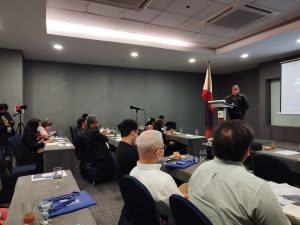
In February 2022, the POCB organized a High-Level Construction Business Mission to the United Arab Emirates led by the CIAP Chairperson, then DTI Secretary Ramon M. Lopez. At the sidelines of PhilConstruct events for 2022, the POCB conducted series of Information Sessions on Free Trade Agreements (FTA) focused on the Regional Comprehensive Economic Partnership (RCEP), the ASEAN / APEC Architect Registry (AAR / AA), and the ASEAN Chartered Professional Engineer (ACPE) entitled “Philippine Construction Industry Moving Through the Crisis”. Networking Sessions of Filipino and foreign companies in the construction and related engineering services sector were likewise organized by the POCB at the sidelines of PhilConstruct Luzon, PhilConstruct Visayas, and PhilConstruct Manila in June, July, and November 2022, respectively.
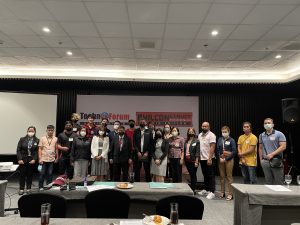
Topics discussed at the Information Session were presented by DTI – Industry Development and Trade Policy Group (IDTPG), Professional Regulation Commission (PRC), Aidea, Palafox Associates, and DTI – Export Marketing Bureau.
Further developing the domestic construction industry
The PDCB is the policy arm of the CIAP, mandated to formulate, recommend and implement policies, guidelines, plans and programs for the efficient implementation of public and private construction projects in the country.
In support of the Philippine construction industry’s rapid recovery, the CIAP, through the Philippine Domestic Construction Board (PDCB), continues to pursue and support policy reform initiatives with the goal of assisting the industry rebound from the 2-year slow down brought by the COVID-19 pandemic and to ensure its sustainable growth.
Guided by the Philippine Construction Industry Roadmap 2020-2030, the PDCB leads the implementation of the Policy Reform Advocacy Plan for the construction industry. The Board continues to collaborate and work closely with both public sector and private organizations, to work on policy reform initiatives.
To ensure efficient and effective implementation of policies on Right of Way Acquisition specifically for infrastructure projects, the PDCB is spearheading dialogues together with a Committee, to discuss proposed amendments to RA 10752. The discussions primarily aim to identify the proposed amendments to the law which would resolve the slow progress of ROW implementation. It was reported that existing ROWA processes are the primary reasons for the delay in commencement of the works, which results to the delay in the progress and completion of the project, thus, ultimately blocking the construction industry’s full potential and projected contribution to national growth and development. With these proposed amendments, the Committee seeks for the harmonization of the local and national policies on ROWA, address inconsistencies, and recognize rights of ICCs/IPs in their ancestral domain, among others.
Moreover, amendments to the quarry law are also being discussed by another Committee organized by the PDCB. It is recognized that quarrying contributes to the country’s infrastructure and overall economic development. To realize its full potential, the review of RA 7942 (Philippine Mining Act of 1995) and RA 7160 (Local Government Code of 1991) is necessary to address the perceived flaws and deficiencies in the said laws, specifically on sourcing, extraction, transport, fees and taxes, as well as the streamlining of quarry permitting processes for government infrastructure projects. With these proposed amendments, the Committee seeks for the streamlining of processes for processing of Quarry/Sand and Gravel, Government Gratuitous Permit, & Environmental Compliance Certificate, as well as provision for more efficient enforcement of guidelines and policies.
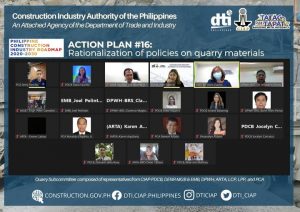
Another important issue in the construction industry that the PDCB is focusing on is the issue on security of payments. The PDCB formed a Committee that will work on the drafting of proposed legislation on Security of Payments. The proposed Security of Payment Act (SOPA) aims to maintain the economic viability of ongoing construction projects by ensuring that progress payments are not withheld so that work continues and the dispute on a particular claim is adjudicated in real-time. This will facilitate cash flow in private and public construction projects.
In line with its vision of a sustainable construction industry, the Board is also working and supporting the legislation of a 30-Year National Infrastructure Program, a measure that will ensure continuity in the development and implementation of projects in the 30- year program – across Administrations, regardless of changes in national leadership. Long-term perspective is needed in viewing the industry and this Program will serve as a predictable roadmap for major infrastructure projects for the construction industry, investors, and related sectors in crafting and carrying out long-term business plans. This aims to provide more effective and lasting engineering measures to address short and long-term issues, including climate change and natural risks and disasters, among others.
Recognizing the importance of cooperation between the government and the private sector, the PDCB supports and advocates for the enactment of a new Public-Private Partnership (PPP) Law, and support policy development for standardized PPPs at the local level.
The PDCB organized various small working groups that are working on policy recommendations and formulation of inter-agency programs with the aim of improving the quality of construction services, consistent with the principles of sustainability and resiliency. Among these on-going works and projects are on the advocacy on research and development for the use of innovative and alternative sustainable materials and technologies. There are also ongoing discussions for the proposed amendments to the existing Environmental Impact Assessment Law, with the proposal of incorporating a comprehensive and integrated strategic environmental assessment of infrastructure programs and projects that are sensitive to biodiversity.
In relation to sustainability and efficiency, the PDCB is on top of the implementation of the Constructors’ Performance Evaluation System (CPES), a system of grading the performance of a constructor for a specific kind of projects using a set of criteria. The evaluation is done at certain stages during the actual construction of the project, and upon its completion. To further improve the implementation of CPES, the PDCB has accredited and certified 27 new trainers on CPES that will help train future CPES Evaluators.

Among the flagship programs of the Board is its mandate on promoting fair and equitable contract conditions. The PDCB is continuously promoting the use of CIAP Document 102 or the Uniform General Conditions of Contract for Private Construction. The PDCB certified 19 new CIAP Document 102 Trainers who are the new partners of the agency in promoting the document.
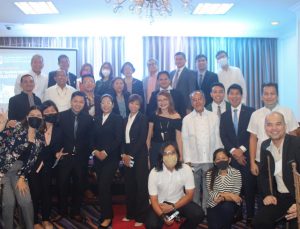
These programs will ensure that the PDCB’s commitment and resolve to continuously work on policy reform initiatives will lead the industry and its constituents to achieve its full potential and to become global partners in building nations.



